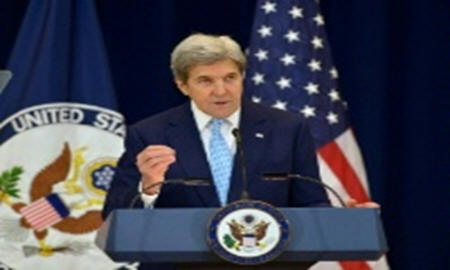www.aljazeerah.info
Opinion Editorials, January 2017
Archives
Mission & Name
Conflict Terminology
Editorials
Gaza Holocaust
Gulf War
Isdood
Islam
News
News Photos
Opinion Editorials
US Foreign Policy (Dr. El-Najjar's Articles)
www.aljazeerah.info
|
Kerry's State Department Speech May Help Define a New Policy Agenda on the Israel-Palestine Conflict By James J Zogby l-Jazeerah, CCUN, January 4, 2017 |
 |
 |
|
What Kerry Did
Secretary of State John Kerry's valedictory speech on the Israeli-Palestinian conflict unleashed a firestorm of criticism from the very same folks who had just finished hyperventilating over the US abstention on a Security Council resolution a few days earlier.
The speech, itself, was divided into three parts. Kerry opened with an accounting of all that the Obama Administration had done for Israel in the past eight years. And he closed with a list of principles he said should serve as the basis for a future Israeli-Palestinian peace. The largest part, the middle, was a passionate indictment of Israel's settlement policy in the West Bank and East Jerusalem—the most comprehensive critique ever given by an American political leader.
During the past 50 years, successive US Administrations have done their best to avoid public criticism of Israel. There have been momentary outbursts of displeasure. But, for the most part, when US officials wanted to challenge Israel's behavior, they prodded, cajoled, pleaded their case, or resorted to offering "incentives". They have never "taken Israel to the wood shed". That's what Kerry did and that was what prompted the reaction.
In response, Israeli Prime Minister Benjamin Netanyahu delivered the political equivalent of tantrum even before Kerry finished his remarks. President-elect Donald Trump tweeted his displeasure. And Members of Congress, from both parties, rushed to issue statements pledging their full support for Israel and its leader, while roundly criticizing their own Secretary of State.
Why the hysteria? As Kerry, himself acknowledged, the speech was not going to change realities on the ground nor would it force the Israelis to alter their behavior. And, as Donald Trump tweeted, with only a few weeks left before the end of the Obama Administration, it is clear that Israel is not going to pay a price in terms of its relationship with Washington.
None of these reactions, of course, paid any attention to the opening or closing parts of Kerry's speech. Israel and its supporters have made a habit of treating as their due the aid and support they have received from the Obama Administration. And, as for the "Kerry Principles", they were bound to be ignored, since everyone knows what they are but see no possibility that they will be realized.
What set off the firestorm was that Kerry dared to publicly and forcefully criticize Israeli policy. And that was what the overreaction intended to snuff out. The standard Israeli approach used in situations of this sort is to launch a campaign of intimidation designed to pummel the offender into submission and to discourage others from taking similar course.
I remember back in 2003, in the lead up to the 2004 presidential primaries, then Senator Kerry addressed our Arab American Institute national conference poignantly describing the daily hardships faced by Palestinians under occupation. He concluded his remarks by condemning the "separation wall" that Israel was constructing in the West Bank, calling it "a barrier to peace". For weeks, Kerry was pummeled by pro-Israeli activists and donors until he finally relented and apologized for his remarks.
Much the same happened with Justice Richard Goldstone, one of the co-authors of the United Nations report on Israeli violations of human rights and international law in its 2008/9 onslaught of Gaza. I met the man and heard him describe how painful it had been for him to see what Israel had done and then feel compelled to condemn their behavior. The response from Israel and Congress was intense and unrelenting. Most critics denounced "Goldstone" without even reading the report. Facts didn't matter, snuffing out criticism and making the critic pay a price did.
After being shamefully battered and even denied entry to Israel to visit his family, Justice Goldstone relented and wrote a Washington Post oped apologizing for some of the language he had used to describe Israeli behavior. At that point Israel announced victory and called off the attack.
This past summer, my colleagues and I went through somewhat the same experience after being appointed by Bernie Sanders to serve on the Democratic Party platform drafting committee. There was an effort to discredit and silence us even before the platform deliberations began. They didn't need to turn the heat up too high because the Clinton campaign made it clear that they would brook no criticism of Israel in the document. As a result, our efforts to add the words "occupation" and "settlements" were in vain.
And now comes Kerry's State Department speech in which he didn't just criticize Israel's occupation and settlement policy, he also demolished the arguments Israelis use to defend their actions. At the same time, he provided a tutorial on the damage done to peace by settlements. Kerry's speech will not change Israeli policy. And with Trump in the Oval Office three weeks, the speech most certainly will not affect a change in US policy. But what Kerry has done, if he doesn't relent, is shatter the taboo that has sheltered Israel from official criticism, while laying out the arguments needed to rebut Israeli efforts to justify their policies.
To some, especially Palestinians, this may seem like "too little, too late". But as someone who has been a part of the effort to create an American debate on Israeli policies, Kerry's intervention is both welcome, validating, and empowering. He laid down markers that should help liberals and progressives define a policy agenda on the Israel-Palestine conflict—exactly what we need as we enter the challenges of the Trump era.
***Big Day at the United Nations
by James J. Zogby
There was considerable drama leading up to the passage of United Nations Security Council Resolution 2334 (UNSCR 2334) reaffirming the illegality of Israeli settlements.
It began with all hell breaking loose Thursday morning when it became clear that the Egyptians would submit their resolution on Israeli settlements for a vote at the Security Council and that the Obama Administration would support the effort, either by voting in favor or by refusing to veto it.
On Wednesday, there had been a hint that something was up. The White House spokesperson appearing on a cable TV news program referred to Israeli settlements as illegal—the first time that had happened since the Carter Administration. While he later attempted to "clarify" his remarks, the point had been made. This was followed by an announcement that Secretary of State John Kerry would make a policy address Thursday in advance of the UN meeting that was to consider the resolution.
President-elect Donald Trump sprang into action by tweeting—"The resolution being considered at the United Nations regarding Israel should be vetoed". This was echoed, minutes later, by a nearly identical tweet from Israel's Prime Minister Bejamin Netanyahu. It has been reported that both leaders made direct calls to Egypt's President Abdul Fattah el-Sisi pressuring him to withdraw the resolution. Egypt folded and pulled the resolution from consideration. Kerry's speech was abruptly cancelled.
Late Thursday, New Zealand, working together with Malaysia, Senegal, and Venezuela, with the support of the PLO, issued an ultimatum to Egypt to either immediately introduce the resolution or they would do it themselves. When Egypt did not, the New Zealand-led group followed through and a vote was scheduled for Friday afternoon. In response to this development, the threats from the Israelis,the President-elect, and Members of the US Senate increased in intensity.
At 2:00 pm, the Security Council convened. Members spoke and then voted—14 in favor, none opposed, with the United States abstaining, thereby, guaranteeing the resolution's passage. Adding to the day's drama, following the passage of UNSC 2334, the usually staid Security Council chamber broke into sustained applause.
President-elect Trump, ever the bully, responded with an ominous threat: "As to the UN, things will be different after Jan. 20th". Senator Lindsey Graham, Chair of the committee that oversees foreign operations' funding called the resolution a "provocative action" that "must be dealt with sternly and forcefully" and threatened to cut US support for the United Nations. For his part, Netanyahu reacted hysterically terming the vote "shamelessly anti-Israel", accusing the Obama Administration of "ganging up" against Israel", and declaring that Israel would not be bound by any of the terms of the resolution.
Looking at the text of Security Council Resolution 2334, itself, one might wonder why all the drama and overreaction. It is, in fact, largely a restatement of decades of US policy toward the Israeli-Palestinian conflict. The resolution reaffirms well-established principles of international law regarding the inadmissibility of the acquisition of territory by force and the applicability of the Fourth Geneva Convention to the occupied territories. Seen in this light, the resolution declares that Israel's confiscation of land, construction of settlements, and the transfer of their population into the occupied territories are violations of international law.
The resolution goes on to remind both the Israelis and Palestinians of commitments they have made to the international community citing the Madrid peace conference and the Quartet's Roadmap—specifically noting how the settlement enterprise endangers the possibility of a two-state solution and a peaceful negotiated resolution of the Israeli-Palestinian conflict, while reminding the Palestinians of their responsibility to condemn all acts of violence against civilians and incitement to violence.
There are those who may dismiss UNSCR 2334 as just another resolution without teeth that will be ignored. But last month's 156-3 vote in the UN General Assembly in support of a similarly worded statement and now this Security Council vote establish a growing world-wide united front against Israel's aggressive annexationist policies, threatening to further isolate Israel and a Trump-led United States in the international community.
What the reactions of Trump and Netanyahu make clear is that, despite their hollow words to the contrary, they have no intention of supporting a just resolution to the conflict and apparently don't give a damn about what the rest of the world may think. This is what we may have expected—but we now see it playing out in real time a month before the new Administration takes office.
Bullying and threats of temper tantrums might have intimidated Egypt, but they did not dissuade the nations of the world from speaking in one voice. Moving forward, this is something that both the future Trump Administration and Israel's Netanyahu must consider. As Israel continues to advance legislation "legalizing" illegal outposts; as Trump considers flaunting law and world opinion by moving the US Embassy in Israel to Jerusalem; and as the Senate decides whether to make good on threats to cut or reduce US dues to the UN—they run the risk of international outrage, fraying ties with allies, and even sanctions. These are consequences to consider.
This drama will continue to play out in the New Year—and it all began on December 23rd, a big day at the United Nations.
***Share the link of this article with your facebook friends
|
|
|
|
||
|
||||||


